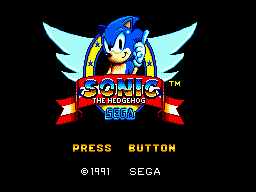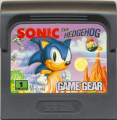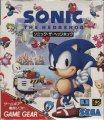Difference between revisions of "Sonic the Hedgehog (8-bit)"
From Sonic Retro
(→Game Gear version: these are the same...) |
(port of some wikipedia info and rearranged things.) |
||
| Line 11: | Line 11: | ||
| seealso=Sonic the Hedgehog (16-bit) | | seealso=Sonic the Hedgehog (16-bit) | ||
}} | }} | ||
| − | + | '''''Sonic the Hedgehog''''' was a 8-bit port of [[Mega Drive]] game of the same name. It was released for the [[Sega Master System]] and [[Sega Game Gear]]. The Master System was thriving in Brazil at the time of its launch in that country on October 23, 1991. The Game Gear version was released in Japan on December 28, 1991 and was also released in North America and Europe in that same month. The plot of this game is that ''[[Sonic the Hedgehog]]'' is fighting [[Doctor Robotnik]] and he has to take the six [[Chaos Emeralds]] to free the land of Robotnik's pollution. | |
| − | The | + | ==Gameplay== |
| + | The gameplay is similar to that of the [[Sonic the Hedgehog (16-bit)|Sega Genesis version]]. The Items available and moves are the same as is the gameplay, although slower than the Mega Drive game. There are some differences however: Point markers are replaced by point arrow monitors. Rings dropped after taking a hit cannot be re-collected. Chaos Emeralds aren't found in special stages, rather, they are hidden in one stage in each of the six zones. The Special Stages exist merely as a bonus stage where players could collect Continues and Extra Lives. | ||
| − | + | Three of the zones came from the Genesis version of the game. [[Bridge Zone]] and [[Jungle Zone]] are considered unusual today for ''Sonic the Hedgehog'' zones. However, this was Sonic's second game, so such norms hadn't been established yet. Each zone has three acts. The first two acts were standard levels, but the third act was merely a short run up to the boss and contained no rings. Trial and error were required for the player to defeat the bosses. | |
| − | |||
| − | |||
==Differences between the Master System and Game Gear versions== | ==Differences between the Master System and Game Gear versions== | ||
| − | The Game Gear version has a smaller screen [[resolution]], but a higher color [[palette]]. Sonic's [[sprite]] is smaller and the control feels lighter. In the first zone, warning signs had been placed because the high speed combined with the narrow screen could present problems. Jungle Zone Act 2 allowed for vertical descent without losing a life, which made this stage easier in the Game Gear version. Labyrinth Zone's level design was different in this version also, and the Chaos Emerald is in a totally new location. Several bosses, including the very last one, | + | The Game Gear version has a smaller screen [[resolution]], but a higher color [[palette]]. Sonic's [[sprite]] is smaller and the control feels lighter. In the first zone, warning signs had been placed because the high speed combined with the narrow screen could present problems. Jungle Zone Act 2 allowed for vertical descent without losing a life, which made this stage easier in the Game Gear version. Labyrinth Zone's level design was different in this version also, and the Chaos Emerald is in a totally new location. Several bosses, including the very last one, were modified or even replaced. The special stages also got redesigned, with all springs being of like color. |
==Manuals== | ==Manuals== | ||
Revision as of 16:18, 15 July 2008
| Sonic the Hedgehog |
|---|
| System(s): Sega Game Gear & Master System |
| Publisher: Sega |
| Developer: Ancient |
| Genre: 2D Platform |
Sonic the Hedgehog was a 8-bit port of Mega Drive game of the same name. It was released for the Sega Master System and Sega Game Gear. The Master System was thriving in Brazil at the time of its launch in that country on October 23, 1991. The Game Gear version was released in Japan on December 28, 1991 and was also released in North America and Europe in that same month. The plot of this game is that Sonic the Hedgehog is fighting Doctor Robotnik and he has to take the six Chaos Emeralds to free the land of Robotnik's pollution.
Contents
Gameplay
The gameplay is similar to that of the Sega Genesis version. The Items available and moves are the same as is the gameplay, although slower than the Mega Drive game. There are some differences however: Point markers are replaced by point arrow monitors. Rings dropped after taking a hit cannot be re-collected. Chaos Emeralds aren't found in special stages, rather, they are hidden in one stage in each of the six zones. The Special Stages exist merely as a bonus stage where players could collect Continues and Extra Lives.
Three of the zones came from the Genesis version of the game. Bridge Zone and Jungle Zone are considered unusual today for Sonic the Hedgehog zones. However, this was Sonic's second game, so such norms hadn't been established yet. Each zone has three acts. The first two acts were standard levels, but the third act was merely a short run up to the boss and contained no rings. Trial and error were required for the player to defeat the bosses.
Differences between the Master System and Game Gear versions
The Game Gear version has a smaller screen resolution, but a higher color palette. Sonic's sprite is smaller and the control feels lighter. In the first zone, warning signs had been placed because the high speed combined with the narrow screen could present problems. Jungle Zone Act 2 allowed for vertical descent without losing a life, which made this stage easier in the Game Gear version. Labyrinth Zone's level design was different in this version also, and the Chaos Emerald is in a totally new location. Several bosses, including the very last one, were modified or even replaced. The special stages also got redesigned, with all springs being of like color.
Manuals
- Sonic the Hedgehog (8-bit) US Manual
- Sonic the Hedgehog (Game Gear) JP Manual
- Sonic the Hedgehog (Master System) EU Manual
Also Released On
- Sonic Adventure DX: Director's Cut for the Gamecube (2003)
- Sonic Mega Collection Plus for the Sony Playstation 2 and Microsoft X-Box (2004)
Production Credits
Programmer: Shinobu Hayashi
Graphic Designer: Ayano Koshiro, Takefuni Yunoue
Sound Producer: Masato Nakamura
Re-arranging: Yuzo Koshiro
Physical Scans
Game Gear version
United States
Europe
Japan
Master System version
Europe
| Sonic the Hedgehog games for the following systems | |
|---|---|
| 1991 Sonic the Hedgehog 1992 Sonic the Hedgehog 2 1993 Sonic Chaos | Dr. Robotnik's Mean Bean Machine 1994 Sonic Drift | Sonic Spinball | Sonic the Hedgehog Triple Trouble 1995 Sonic Drift 2 | Tails' Skypatrol | Tails Adventures | Sonic Labyrinth | Sonic 2 in 1 1996 Sonic Blast Prototypes Sonic the Hedgehog (Game Gear prototype) | Sonic Chaos prereleases | Sonic Spinball (8-bit) prereleases | Sonic Triple Trouble prereleases | Sonic Blast prereleases Unreleased Sonic's Edusoft
| |






